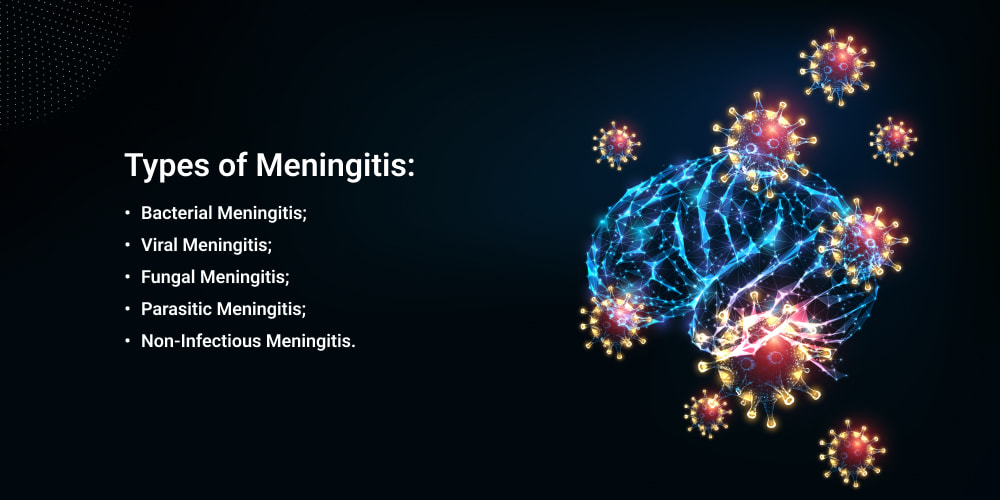Meningitis is a serious disease. It affects the protective membranes surrounding the brain and spinal cord. People can get this disease through normal inflammation.
This inflammation can lead to various symptoms. It includes fever, headache, and a stiff neck. In severe cases, meningitis can cause seizures, loss of consciousness, and even death.
So, timely treatment is vital to prevent serious meningitis effects. But even people who recover from meningitis may have long-term effects. These effects may vary depending on the severity of the infection. It also depends on the patient’s age and health status.
It is important to recognize the possibility of long-term effects of meningitis. You should provide appropriate support and treatment for people who have recovered from the disease. With early intervention and ongoing care, many people can successfully manage the long-term effects of meningitis and maintain a good quality of life.
In this article, we will help you learn all about the types and side effects of meningitis. So, read on to find out what you need to know.
Types of Meningitis
Meningitis is a medical condition caused by inflammation of the meningitis. It is essentially a protective covering that surrounds the brain and spinal cord. There are several different types of meningitis. Each of these can be a different pathogen. And accordingly, each has different symptoms and treatment options.
Meningitis affects people of all ages. But it is most common in children, adolescents, and young adults. Why? Because their immune systems are not fully developed. It makes them more susceptible to infections. Additionally, college students living in dormitories, military recruits, and people traveling to areas where meningitis is more common are also at increased risk.
So let’s take a closer look at each type of meningitis. Understanding the type of meningitis is essential for appropriate diagnosis and treatment.
Bacterial Meningitis
You can get this type of meningitis from bacterial infections. It is the most severe form of the disease. The bacteria that cause this type of meningitis can enter the bloodstream. They then travel to the brain and spinal cord. It is there that they cause the long-term effects of meningitis. The most common bacteria that cause bacterial meningitis are:
- Streptococcus pneumoniae.
- Neisseria meningitidis.
- Haemophilus influenzae type b.
Bacterial meningitis after effects requires immediate antibiotic treatment. Your doctor will prescribe them to prevent serious complications.
Viral Meningitis
You can get this type of meningitis from viral infections. It is the most common form of the disease. Viruses that cause viral meningitis are spread by:
- Contact with infected people
- Contaminated food or water
- Through the bite of an infected mosquito.
The symptoms of viral meningitis are similar to bacterial meningitis after effects. But they tend to be less severe. Most people with viral meningitis recover without specific treatment. You can recover within one to two weeks.
Fungal Meningitis
You can also get this type of meningitis from fungal infections. Unlike the other types, you can rarely get this type of disease. It usually affects people with weakened immune systems, such as HIV/AIDS. Or it affects people who have had organ transplants. You can find fungi that cause fungal meningitis in soil, dust, and bird droppings.
Meningitis effects can include quite complex symptoms. Treatment involves taking antifungal medications. And the length of treatment can vary depending on the severity of the infection.
Parasitic Meningitis
You can get this type of meningitis from parasitic infections. Like the previous type, you can rarely get this type of disease. One of the well-known causes of parasitic meningitis is the amoeba Naegleria fowleri. You can find it in warm freshwater.
The long-term effects of meningitis can be extremely serious. Treatment includes taking medications as prescribed by your doctor. In addition, you need to be constantly monitored by a doctor. And you need to keep an eye on your health.
Non-Infectious Meningitis
You may not get this type of meningitis from infections. In this case, it is due to other diseases. For example, it could be:
- Autoimmune disorders
- Certain medications
- Cancerous tumors
Side effects of meningitis may include the same problems as other types. It is a rare form of meningitis but can be difficult to diagnose. Treatment involves addressing the underlying condition that is causing the meningitis.
In conclusion, each type of meningitis has different long-term effects and treatment options. It is essential to seek medical attention if you suspect you or someone you know has meningitis. Early diagnosis and treatment are critical to prevent serious complications.
Side Effects of Different Types of Meningitis
Meningitis is a rather serious disease. As you already know, it causes inflammation of the protective membranes surrounding the brain and spinal cord. But what is the most unpleasant thing about any disease? Of course, any disease, like meningitis, causes unpleasant effects.
These can be completely different symptoms. You can get from mild to life-threatening side effects of meningitis. The type of disease itself can affect the severity and duration of the side effects. That’s why you should start treating the disease as early as possible. But to identify the disease, let’s first look at the symptoms. Then, you can start treatment quickly to prevent complications and improve results:
Inflammation of the Brain
Let’s start with one of the most common long-term effects of meningitis. Unfortunately, you can get brain inflammation because of this disease. You may also know it as encephalitis. It can lead to some neurological symptoms. These symptoms include:
- Confusion of consciousness.
- Memory loss
- Seizures
- And even coma
Deafness
Another meningitis effect is deafness. The disease itself can cause nerve damage. It damages the nerves that transmit sound from the ear to the brain. In some cases, you can get deafness. Patients can get either partial or complete deafness.
Sensitivity to Light
Many meningitis patients experience light sensitivity, a condition known as photophobia. It can cause eye pain, headaches, and difficulty performing daily activities.
Severe Headache
A severe headache is a common meningitis effect. This headache is often described as a throbbing pain that worsens in the morning or when lying down.
Impaired Balance
Side effects of meningitis can lead to another problem. Unfortunately, some patients may experience impaired balance and coordination. Of course, this makes it difficult to walk and perform other tasks. As a consequence, people may suffer more injuries.
Blood Poisoning
Meningitis can lead to blood poisoning. Blood poisoning is when bacteria from an infection get into the bloodstream. They then all spread to other parts of the body. It can be life-threatening if not treated in time. People can get more effects and go into a coma.
Limbs at Risk
In severe cases, meningitis can lead to septicemia. It is a condition in which bacteria from the infection spread to the extremities. They then cause tissue damage. In some cases, there is a need for amputation. It is often bacterial meningitis after effects.
Convex Fontanelle
Babies with meningitis can develop a convex fontanelle. This condition is where the soft spot on the top of the baby’s head becomes raised and bulging. You may see this reaction from the body because of increased pressure inside the skull.
Joint pain
Meningitis can cause inflammation in the joints. It leads to pain, stiffness, and decreased mobility. As a result, people with this meningitis effect may reduce their mobility. All because they feel less pain that way.
In conclusion, meningitis can cause several long-term effects. It is very important to seek medical help if you suspect you or someone you know has meningitis. That way, you can prevent serious complications and long-term effects.
For early diagnosis, we invite you to our Lone Star Neurology clinic. Our professionals will diagnose the type of your disease as accurately as possible and prescribe treatment. You can trust us with your health and be assured of the best results.
FAQ
- What are the long-term side effects of meningitis?
Long-term side effects of meningitis may include hearing loss, seizures, memory problems, etc.
- Can meningitis cause problems years later?
Yes, meningitis can cause problems years later. It can be hearing loss, cognitive impairment, and even death in severe cases.
- Which organ in the human body is primarily affected by meningitis?
Meningitis primarily affects the brain and spinal cord. They make up the central nervous system.






 (3 votes, average: 3.33 out of 5)
(3 votes, average: 3.33 out of 5)






Please, leave your review
1 Comment
Stephanie
17/02/2024
Hello,
I am a survivor of bacterial meningitis when I was just a few months old. My prognosis was very bad. They did not believe I would survive. I did die and they were able to revive me. I had a lot of ups and downs due to complications from it during my childhood. I was almost completely deaf in my left ear and had some partial deafness in my right ear. I now have hearing back, but as I get older I feel like my hearing is getting worse. I do believe the correlation for this is because I had bacterial meningitis. I also developed mentally and physically slower than most kids/teens. I hope one day they can find a ways to help us when these things arise for survivors of this disease. Thank you.
Write a comment: